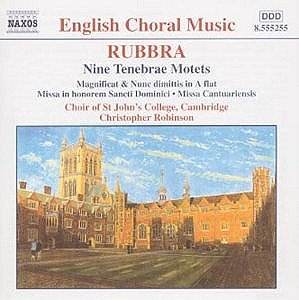ENGLISH CHORAL MUSIC ON NAXOS
Edmund RUBBRA
Magnificat and Nunc Dimittis Op.65; Missa in Honorem Sancti Dominici
Op.66 ; Tenebrae Nocturnes Op.72 ; Missa Cantuariensis Op.59.
Prelude and fugue on a theme of Cyril Scott for organ Op.69;
Meditation for Organ Op.79.
 Choir of St. John's College
Cambridge/Christopher Robinson
Choir of St. John's College
Cambridge/Christopher Robinson
Robert Houssart (Organ)
 NAXOS 8.555255
[65.48]
NAXOS 8.555255
[65.48]
Crotchet
AmazonUK
AmazonUS

This is the fourth in Naxos' series of English Choral Music. It is also the
first disc of Rubbra's church music to be recorded by an all male college
choir who are quite likely to have sung most of this music as part of the
weekly liturgy before recording it.
An atmosphere of confident understanding is to the fore and technical
difficulties are easily overcome. The overall effect of the disc is quite
marvellous and I'm sure that Rubbra would have been delighted with it. If
you have been buying recordings of Rubbra's church music in the last two
or three years you may now have accumulated possibly three recordings of
the Missa Sancti Dominici Op.66 (1949) including the very fine one
by Westminster Cathedral choir on Teldec conducted by James O'Donnell which
is unsurpassable. This St. Johns performance is first rate. The tempos are
perfectly judged and the intonation is excellent.
As far as I know Missa Cantuariensis (1946) has only been recorded
once before - by Richard Hickox and the St. Margaret's Westminster Singers.
This was on a long deleted RCA LP made in the presence of the composer in
December 1975. I have always regarded that recording as a yardstick for this
mass, as the composer was present at the sessions and was thrilled with the
result. Now, with the exception of the Missa Brevis Op.137 for treble
voices, all of the masses are available. The demands of this mass are
considerable. Several sections are in 8 parts and the tessitura for the boys,
and often for the tenors, is high. Although the voices are pushed to the
extremes they are always technically in control and Robinson moves the tempo
along appropriately where he needs to.
At the rehearsals of the Tenebrae Motets (1951/62) the choir was
apparently deeply moved by the music. I must say that they respond very well
to these austere settings. In an interview Christopher Robinson remarks that
" the harmonies arise. from the intricate weave of contrapuntal lines" which
is typical of Rubbra. There are, however, many homophonic passages often
in parallel organum which give the music a strongly Byzantine effect and
this is thirty years before Tavener. There is also a good recording of these
pieces on Gloriae Dei Cantores (024), a mixed voiced American choir directed
by Elizabeth C. Patterson. I have grave reservations about the Mass Op 66,
which they record but they too are in fine form for the Nocturns.
Their more relaxed approach to tempi benefits the Holy Week atmosphere, but
the St. Johns choir attack the music with a passion which is also most in
keeping.
The organ works have not been recorded before. Bernard Rose of Magdalen College,
a friend of Rubbra when they both worked in Oxford during the 1950s and 1960s,
arranged the Prelude and Fugue on a theme of Cyril Scott for organ.
The word 'Meditation' was a favourite with Rubbra and this piece certainly
suits its name. It is built entirely on a pedal C. The year before writing
it he had built a motet Let us now praise famous men Op.76 no.1 (1952)
completely on an organ pedal G.
The Magnificat and Nunc Dimittis would be in the choir's regular
repertoire. The only other all male college choir who have recorded it were
Kings College in 1980 on a record, now on CD, called 'Music for Ascension
Day'. (EMI 3764). Again, it was recorded by the American choir mentioned
above who take their time with it, whereas the ASV recording with the Gonville
and Caius Choir Cambridge under Geoffrey Webber (DCA 881) get through it
at considerable speed and the effect ends up sounding a little matter-of-fact.
To sum up: There are no new choral works here added to the catalogue but
it is worth investing the modest amount of £5 as the choir is in excellent
form and the music is superbly handled and clearly and evocatively recorded.
Another gem in this Rubbra centenary year.
Gary Higginson

